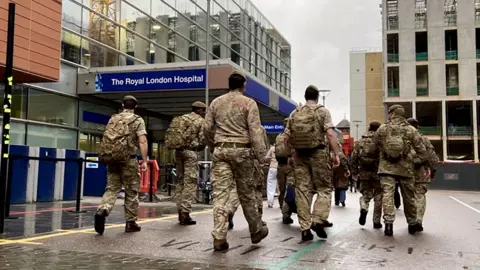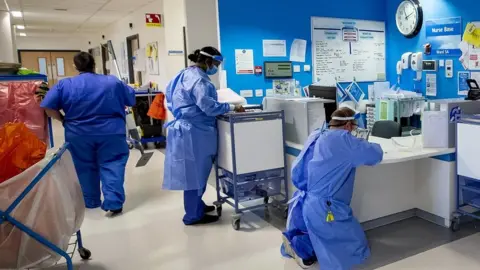Covid: Armed Forces send 200 personnel to support the NHS in London
 BBC
BBCThe Armed Forces have sent 200 personnel into NHS hospitals across London to plug staff shortages.
The Ministry of Defence will provide 40 defence medics and 160 general duty personnel for the next three weeks.
Hospitals in London have been hit hard by staff absences, with thousands off sick or isolating as the Omicron variant surged through the capital.
Earlier this week, the PM said he hoped England could "ride out" the latest wave without further restrictions.
Pressure on London hospitals has increased over the past month, with 4,000 patients currently in hospital with Covid compared with 1,100 in early December.
The Royal College of Nursing's director for England, Patricia Marquis, said the deployment showed the government could not deny there was a "staffing crisis" in the NHS.
"The prime minister and others can no longer be dismissive of questions about the ability of NHS staff to deliver safe care," she said.
Across the UK, about 1,800 armed forces personnel are supporting the NHS response to the pandemic.
As of Friday morning, 16 hospital trusts in England were experiencing critical incidents - about one in eight of the total.
A critical incident is declared when a trust is worried it might not be able to provide core priority services, such as emergency care. It means they can get extra help and draft staff in from other duties.
Approximately 4% of staff at acute NHS trusts in England were off because of Covid each day during the week ending 2 January, latest figures show.
That equates to 35,596 staff each day on average, up by 41% on the previous week.
But the overall figures mask stark regional differences. Some of the hardest-hit hospitals in the country are in the north of England - Sheffield's teaching hospitals were missing 11% of staff due to Covid.
But in London, where data suggests a slowdown in the Omicron wave after Christmas, staff absences actually fell very slightly.
There are 236 patients on ventilators in the capital - compared with 190 last month - and daily admissions are about four times higher than the beginning of December.
Vaccination rates in London are also running behind the UK as a whole, with 69% having had a first dose, 63% a second and 40% a booster jab.
Across the UK, 90% have had their first jab, 83% have had a second, and 61% a booster.
Health Secretary Sajid Javid urged people to get their vaccinations to help cut the pressure on the NHS, as he welcomed support from the military.
He said: "Once again they are stepping up to assist NHS workers who are working round the clock across the capital, helping the health service through this difficult winter period where the need is greatest."


The NHS is in crisis every winter - so is this any different?
The Army has been brought in before to lend a hand in extreme circumstances and has already been used in the pandemic.
This tends to be the busiest week for the health service so it's not surprising given the pressure it is under that steps like this are being taken or that we are hearing so much about critical incidents.
As of yesterday, one in eight hospital trusts in England had declared a critical incident - an internal warning to the system that they are struggling to provide priority services such as emergency care.
We do not have comparable figures for previous years.
But to provide some comparison, there are two key figures to keep in mind.
Firstly the number of Covid admissions being seen is already double the number normally seen at this time of year for all types of respiratory infection - and it is still rising.
Staff absences are also thought to be twice what they would usually be - although the latest figures are not due out until later.

Army medics and support staff have been used to support health services throughout the pandemic - they were deployed to work in Northern Ireland's hospitals in September and were also needed in London this time last year.
Defence Secretary Ben Wallace said the Armed Forces would again be working "hand-in-hand" with NHS staff "to protect the nation from Covid-19".
He added: "They have shown their worth time and again throughout this pandemic, whether driving ambulances, administering vaccines or supporting patients in hospital and they should be proud of their contribution to this truly national effort."
There are 40 teams of five, with one medic and four general duties personnel, who have started work this week and will be allocated according to need.
Medics will work with patients, whereas the soldiers will be working on maintaining stocks, checking in patients on arrival, and conducting basic checks.
Paramedics in the South Central Ambulance Service, which covers Berkshire, Buckinghamshire, Hampshire and Oxfordshire, will also be bolstered with 32 military co-responders, who are expected to stay with them until the end of March.
 Peter Byrne/PA Wire
Peter Byrne/PA WireJane Clegg, the regional chief nurse for the NHS in London, said: "We are thankful for the support of the armed forces alongside thousands of NHS staff, as they respond to the increased demands brought by Covid - ensuring continued high quality care and treatment for the many Londoners being looked after by the NHS this winter."
About 1,800 regulars and reservists from the Army, Navy and the RAF are supporting the NHS response to the pandemic in the UK.
More than 400 military paramedics are assisting ambulance trusts, with 313 in the Welsh Ambulance Service NHS Trust and 96 in the Scottish Ambulance Service.
And more than another 1,000 are working on the vaccine booster programme, with 730 in England, 221 in Scotland and 98 in Wales.

Have you been affected by NHS staff absences? Do you work for the NHS? Share your experiences by emailing [email protected].
Please include a contact number if you are willing to speak to a BBC journalist. You can also get in touch in the following ways:
- WhatsApp: +44 7756 165803
- Tweet: @BBC_HaveYourSay
- Upload pictures or video
- Please read our terms & conditions and privacy policy
If you are reading this page and can't see the form you will need to visit the mobile version of the BBC website to submit your question or comment or you can email us at [email protected]. Please include your name, age and location with any submission.

- THE GREEN PLANET: Preview David Attenborough's incredible new series
- HAVE YOU GOT 'BRAIN FOG'? How to banish winter blues and boost energy

